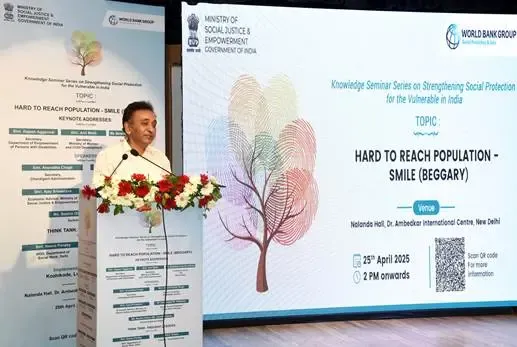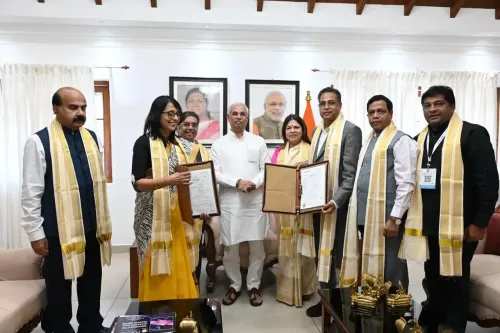Department of Social Justice Explores Issues Impacting Beggars and the Homeless

Synopsis
Key Takeaways
- Importance of grassroots insights from stakeholders.
- Need for foundational documentation for individuals.
- Complex social, religious, and economic factors involved.
- Focus on actionable solutions for rehabilitation.
- Progress under the SMILE initiative is ongoing.
New Delhi, April 26 (NationPress) The Department of Social Justice and Empowerment (DoSJE) convened a seminar aimed at exploring and discussing strategies for the rehabilitation of beggars, the homeless, and the destitute throughout the nation.
This seminar, held in collaboration with the World Bank, centered around the theme ‘Hard to Reach Population – SMILE (Beggary)’ in the national capital.
The gathering, which included participation from both national and international experts, is part of an ongoing series of knowledge seminars intended to enhance dialogue and initiatives that bolster social protection systems for the most vulnerable groups in India.
“It is crucial to hear from real stakeholders -- individuals who have successfully transitioned out of begging -- to grasp the underlying causes and the effects of existing support systems,” stated Rajesh Aggarwal, Secretary, DEPwD, Ministry of Social Justice and Empowerment, as he articulated his vision on inclusive development and outreach that considers disabilities.
Aggarwal also recognized the intricate nature of the issue, highlighting its social, religious, and economic aspects.
“Having essential documentation -- such as a registered address, a bank account, and access to healthcare -- is vital for individuals to make identification and support feasible in vulnerable situations,” noted Benedicte Leroy De La Briere, Lead Economist at the World Bank, as she offered a global perspective on the discussion of beggary rehabilitation.
Stressing that such events yield invaluable grassroots insights and authentic field data, La Briere emphasized the need to steer discussions toward focused interventions and implementable solutions.
The seminar also showcased engaging presentations by nodal officers and grassroots organizations from various states, sharing the realities, challenges, and success stories of connecting with hard-to-reach populations.
“Roughly 18,000 individuals have been identified under the SMILE initiative, with 1,612 already rehabilitated,” remarked Ajay Srivastava, Economic Advisor (MoSJ&E). He assured that efforts are in progress to expedite the rehabilitation of those remaining.










